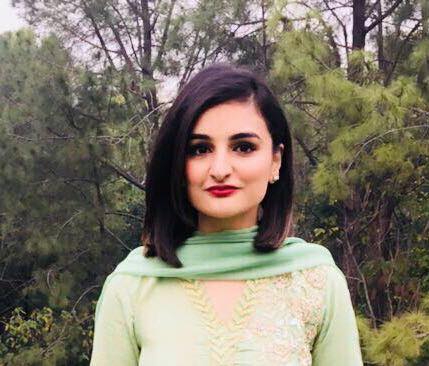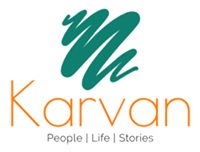Aspiring to be a Criminal Psychologist, Safwa Mir, Editor at Daastan, CEO of SafwaMirWrites and Research Writer at UNDP Pakistan, talks about her career goals and her journey as an editor in this exclusive interview to KARVAN

1. Tell us about yourself?
I am a final year student of BSc Psychology, who aspires to be a Criminal Psychologist one day that has her name in the literary world as well. I am the fourth born to a military father and a housewife mother. I belong from Islamabad but have Kashmiri roots. Since I was a young girl, I have been an avid reader courtesy my parent’s love for book reading. I have always been of the belief that one’s life should be spent productively so that whatever minimalistic act they do, it is worthwhile. Personality wise, I am a conscientious and an extrovert person with love to know everything about anything.
Due to this, my academic and professional life has a good amount of achievements. These include, straight A’s in my IGCSE’S and A Levels, merit scholarships throughout my university life, two research publications underway as a co-author, Editor at Daastan, CEO of SafwaMirWrites, which is my own private company and Research Writer at UNDP Pakistan.
I like sketching in my free time, reading articles, learning languages and collecting quotes from the books I read.
2. As a freelance research writer for UNDP Pakistan, what are your primary responsibilities?
My work as a Research Writer at UNDP Pakistan involved different duties that were dependent on the social project I was doing. Some projects involve transcriptions of interviews of leading CEO’s and owners of businesses in Pakistan or entrepreneurs as part of a research survey. Other projects include writing research-based articles on the leading social issues in the developing country and proposing suitable solutions for dealing with them. Recently, a project involved following up a case study of a young victim of domestic abuse.
I believe that by being a part of an international organization such as, UNDP Pakistan, it is a big step that I have initiated towards the betterment of my society, even though currently it is equivalent to a droplet of water in an ocean.
3. What aspect of editing do you like?
I like to point out the potential in any manuscript that is assigned to me and incorporate ideas with the writers/authors to discuss the prospects of how a certain storyline can be further improved, instead of rejecting it. I have always been of the belief that any written piece or manuscript should never be rejected. Also, I like to point out the importance of the use of contextually appropriate and correct vocabulary in any written piece. One thing I have recently begun pointing out is the difference between a written narration and a spoken narration writing style, that a lot many Pakistani writers and authors confuse between.
4. How has been your experience of working with Daastan so far?
Daastan was the first literary platform that I joined, almost 3 years back and I have since then been in a two-way learning process with Daastan’s team. I have learned about professional behavior and the work-related issues that arise in an online space, and also, to understand the different perspectives and ideas one has towards the same area of interest. But, most importantly, I have learned that there are people out there who have beautiful ideas, exceptional storyline and an eye for the simple, cliché yet extraordinary things in the otherwise mundane routines, however, they lack the proper guidance in penning it down. I am glad that Daastan gave me the opportunity to work with such people, to teach them and in return learn from them to0.
5. You were an editor at Daastan’s “Stories Untold” competitions. Whuch stories did you like reading and editing the most?
I was an editor as well as a content reviewer for the two of the three “Stories Untold” competition, and to be honest I cannot pinpoint any one story that I liked the most. There were certain stories that left an impact on me more than others. However, all stories in their essence were a pleasure and real delight to read.
There were certain stories that I liked editing and putting in an effort, not because they were full of erroneous areas but only because I felt they needed a bit more polishing just because the storyline was new and something I haven’t come across in a while. The stories that I still remember are all of the different genres but still impactful, include, “Talismore’s General Store”, “Kingdom of Dereya: Aitmaad and the Clan of Seven”, “The Blemished Perfection” and “The Glass Ceiling.”
6. Editing requires concentration and diligence. How do you keep yourself focused?
It is true, that editing is a work that requires one to have a scrutinizing eye yet to be open towards any sensitive topic or storyline that is being used as a central theme. It is hard to keep one’s biases aside but not entirely impossible. I always prefer to do justice to any manuscript assigned to me only to respect the feelings of the author/writer who has put in their heart and soul in that work. This is why I always go through any written piece at least three times.
I make time for the work that is assigned to me, I free my mind of any queries and perceptions and then I read the entire manuscript initially once just for a general impact and to assess whether there are any confusing areas or unanswered questions. I put it aside for a few hours and then get back to it again the second time to correct the sentence structures, grammatical errors and any basic editing that is required. This is because, I believe when you fix the correct English or narration, the story automatically brings the flaws to the surface and highlights the transition of scenes. The third time, I go through the manuscript is with the intention of suggesting any plot changes or character descriptions and any other addition or deletion of content. However, I keep the true meaning of the writer/author because, at the end of the day, they are the ones who envisioned it and know better how to express it, while I am there to facilitate them. Again, I never intend to reject any work or any manuscript solely on the reason that, ‘it is not good enough’, or ‘it’s not unique’ or ‘it’s too basic’, which mind you I have come across a lot of such comments from within the editorial circle.
7. Which novels/novelists have inspired you the most?
The list, my friend, is endless about the novels that have inspired me and the novelists who I aspire to become. My inspiration is divided into two phases. One involves the period where I had begun reading novels including Enid Blyton series and the classics by Jane Austen, Fyodor Dostoyevsky, etc. which were my first companions. I can proudly say that my love for being a writer sprang from reading these stories. The second phase involves the period where I graduated from the Enid Blyton series to Harry Potter series, Lord of the Rings series, etc. to all the novels by Dan Brown, Jeffery Archer, John Grisham, Mario Puzo, Luke Delaney, Elif Shafaq, Khaled Hosseini, and many more.
The way these writers made you envision exactly what they had in mind and to experience the same feelings is what I believe makes an incredible writer. This is what I aspire to do too.
8. What do you think are the similarities or differences between writing and editing?
The two overlap one another in many aspects but I believe that everybody can be a good editor but not many can be good writers. It’s true that to be able to edit something, one needs to know the basic rules of writing too but it’s nothing impossible or difficult to do. However, to be a good writer, to be able to make the reader imagine the same things that you have while writing, to be able to relate the reader with their character is something exceptional and to be able to inculcate the same feelings that the writer felt or the character feels is extraordinary which is a talent in itself. Not many are capable of this.
Major confusion that many of my mentored writers had was that to edit a manuscript is equivalent to re-writing the entire plot or storyline or to re-write the whole scene again. To me, editing is a compound of two words, correction and suggestion. An editor corrects the grammar, sentences, tenses and vocabulary use, furthermore, suggesting any changes in plot or scene improvisations. In no way, does the editor become the writer while performing their duty.
A writer is someone who is the content generator. He/she is the author of the original idea, the plot, the storyline, the characters, and the scenes, and only they have the discretion of accepting or rejecting changes as suggested by the editors. There are always exceptions depending on what company policies there are and how sensitive is the central theme at hand.
9. What are your plans?
My plans in the near future involve higher education in Forensics studies, Criminology and Literature, alongside, expanding my freelancing business. However, establishing my own literary agency and working on more on ground social projects in the distant future is another goal I wish to achieve.
10. As an editor and mentor, what message will you give to aspiring writers enabling them to become better writers?
My message would be for them to firstly, acquire ambition in themselves. By having humility and ambition in their attitude and as part of their personality would not only help them be more open to observe their surroundings to get inspiration but will also provide them with the opportunity to learn more. I have seen countless aspiring writers with exceptional writing skills yet they lack in humility and are less open to learning from others. Humility alongside ambition will be their driving force for success in the literary world.
Secondly, to be open to criticism from people on their written work. I will not classify the criticism as healthy, because sometimes crude criticism gives the added oomph for the writer to work better and harder, however, chose certain individuals as constant critiques and even ask a stranger who has a little bit of experience for a third opinion too.
Thirdly, to know your forte and your strength areas. If you are better at fiction writing then polish that, or if you are a master of non-fiction and more factual/history related areas then go for that. This will only be possible if you test out each area and genre. Hence, don’t be afraid to test the waters, and write to the best of your ability. But do get it reviewed! Reading more and diverse literature can help too.
Lastly, do try to keep things real and simple while writing. You don’t always have to be unique in choosing the storyline or to have a novel plot. Sometimes, simple concepts when written from the heart can be impactful too.
Contact Safwa Mir:
Work e-mail: [email protected]
Work account: https://www.meraqissa.com/SafwaMir
LinkedIn: https://www.linkedin.com/feed/
KARVAN envision to showcase the best and the brightest talent from Pakistan. If you have achieved an academic, personal or a professional milestone, or know someone who did, do send us a brief profile at [email protected].
Find us on Facebook @talktokarvan
